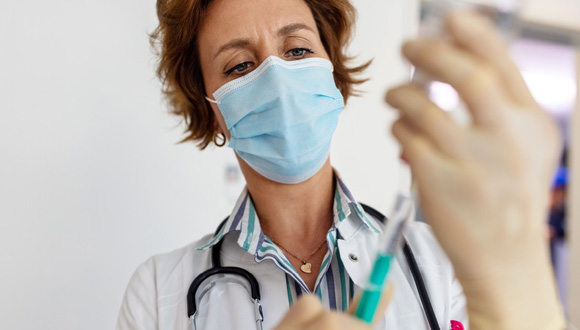Newly Updated COVID-19 Vaccines: Who's Eligible & Everything Else You Need to Know
Sep. 22, 2023 - Katie McCallumLast week, the FDA and CDC approved two newly updated COVID-19 vaccines made by Moderna and Pfizer. These new vaccines are manufactured similarly to previous shots but differ in that they more closely target the strains of COVID-19 that are circulating right now.
The updated shots are anticipated to better protect against these variants — both now as COVID-19 cases are climbing and in the upcoming respiratory season as any additional waves arise. As such, the bivalent boosters released last fall will no longer be available.
Who's eligible for an updated COVID-19 vaccine?
The CDC says that everyone 6 months of age and older is eligible to receive at least one dose of the newly updated vaccine, with the timing and exact number of shots recommended for protection varying based on age, previous vaccination status and health history.
Newly updated COVID-19 vaccine eligibility:
- People 5+ are eligible to receive a single dose of either vaccine, regardless of previous vaccination status and so long as it’s been at least two months since they received their last COVID-19 shot
- Previously vaccinated children ages 6 months through 4 years are eligible to receive one or two doses of an updated vaccine, depending on the previous vaccine they received
- Unvaccinated children ages 6 months through 4 years are eligible to receive either three doses of the updated Pfizer vaccine or two doses of the updated Moderna vaccine
Additional doses may be recommended for people who are immunocompromised.
And if you recently had COVID-19, you may choose to delay vaccination by up to three months — but you don’t need to wait that long. Some people, such as those who are severely immunocompromised, shouldn’t. (Related: How Soon Can You Get Vaccinated After Recovering From COVID-19?)
If you’re not sure whether you need to get an updated COVID-19 shot, talk to your doctor. He or she can help you understand whether you’re up to date and for help determining the right timing for getting vaccinated.
Can I get the new COVID-19 vaccine at the same time as my flu shot and/or RSV vaccine?
With respiratory season looming — a time when two other viruses, influenza and respiratory syncytial virus (RSV) commonly spread — you may wonder if you can get all the vaccines you need this fall at the same time.
The CDC says eligible individuals can receive all three vaccines (flu, COVID and RSV) at the same time, but only if “there are no contraindications” to doing so — which your doctor can help you understand.
Additionally, while most people are eligible for the COVID and flu shots, not everyone is eligible for the new RSV vaccines. And older adults who are eligible may want to receive the RSV vaccine first and wait about two weeks before getting their flu and COVID shots. This delay gives the immune system time to build a robust response to the RSV vaccine. (Related: What to Know About the RSV Vaccine for Older Adults)
Will we need to get an updated COVID-19 vaccine every year?
It’s likely. The FDA has alluded to as much, saying they anticipate “that the composition of COVID-19 vaccines may need to be updated annually, as is done for the seasonal influenza vaccine.”
It’s why an updated version of the vaccine was released this fall. It targets the specific subvariant that circulated this summer and offers protection against the close derivatives that are currently circulating. According to Moderna and Pfizer, it’s also effective against BA.2.86, a lineage that caused some initial concern as to whether it may have changes that allow it to better evade the immune system.
It’s why you’ll still want to receive the newly updated vaccine, even if you got COVID-19 recently, so you can help ensure you remain protected against all the variations of the virus that are out there.








